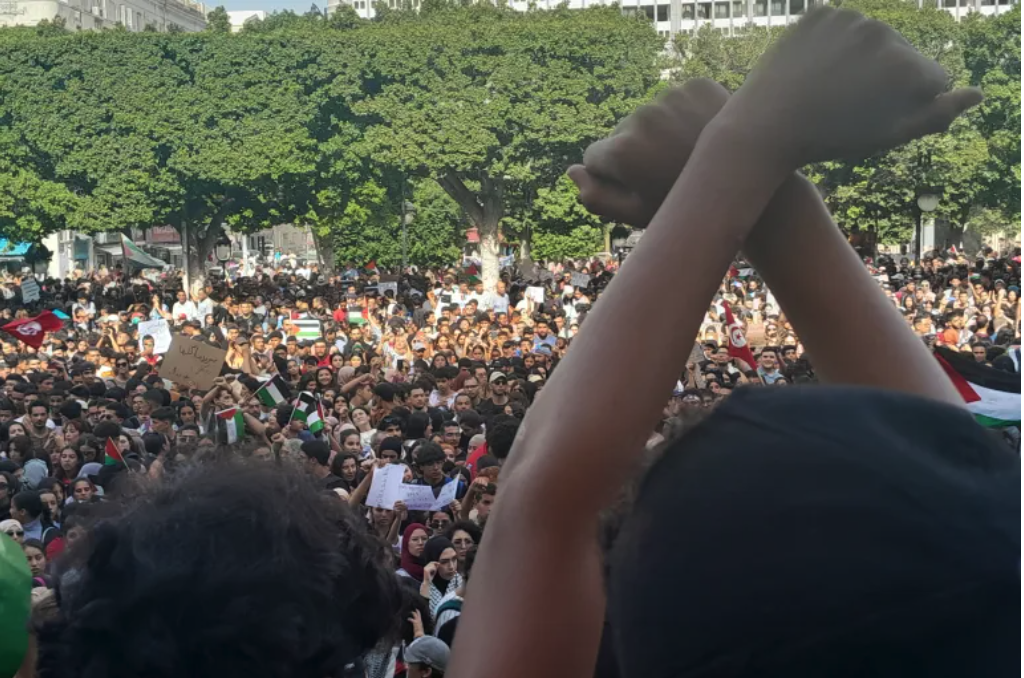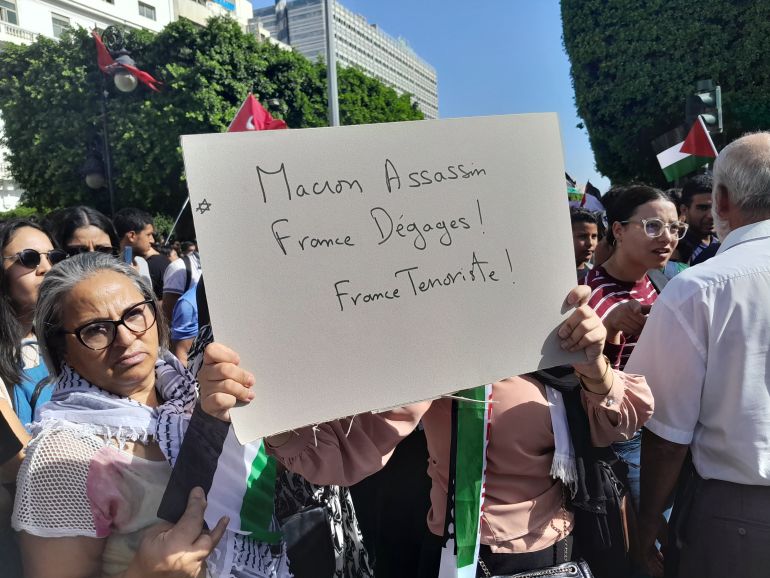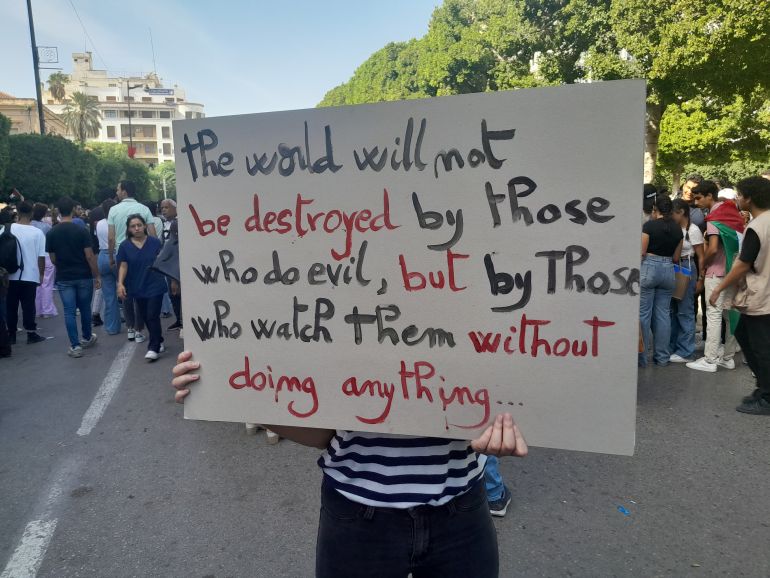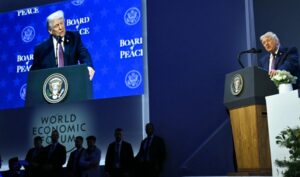
Published 10/25/2023 11:15 | Edited 10/25/2023 18:00
Outrage was already widespread across the Arab world due to the Israeli attack on Gaza, when the bombing of the al-Ahli Arab Hospital, which killed more than 400 people, raised the revolt to a new level. Report from Aljazira brings a disillusioned view of how public opinion in Tunisia is turning against the US and nearby Europe.
The strong demonstrations express growing distrust against France, an old ally of Tunisia, but also with all the cultural influence of the West in the country. The impact of this on the financing of NGOs is already having harmful effects, with attacks on buildings and outrage even among their activists paid by Europeans. People prefer to get information from organizations like Russia Today rather than traditional European and local media.
This growing perception observed in demonstrations throughout the Arab and Muslim world signals that the “West”, represented by the USA and Europe, has become incapable of recognizing the inhumane violence that is being applied in Gaza, 24 hours a day, and that dates back to years ago. An insensitivity and dehumanization of the Palestinians, justified by the obstinate support of these powers for Israel.
In Beirut, Tunis and Cairo, crowds faced tear gas and water cannons as they protested what Tunisians called “Zionist allies.” The US embassy in Cairo warned of “anti-US sentiment” as protesters gathered.
As popular anger took hold, crowds in the streets expressed their rejection of Western foreign policy and its attempts to project influence – or soft power.
O soft power Westernization in the region takes different forms, all aimed at predisposing people to the West through cultural centers, funding civil society, educational awareness, organizing events and encouraging the consumption of Western cultural products.
As the world’s places of power shift and countries like China, India and Russia compete for influence with the traditional presences of Europe and the US, the soft power becomes as important as security cooperation and military power.
And as anger grows over Israel’s unwavering support as it bombs Gaza, activists across the region reject it, pointing to Western hypocrisy in favoring Israeli lives over their own.

‘Arab children don’t matter’
Many Tunisians see the current Western presence in their country as an extension of the legacy of colonization. A legacy that is now prolonged and expressed explicitly by the conflict between Israel and the Palestinian territories.
The US and European rhetoric that the fight for freedom, democracy and all types of rights is a common struggle collapses in the face of the fact that Arab and Muslim communities and children do not matter.
Israel has diplomatic relations both within the Arab world and outside it, but few are as strong as its ties with the US, which provides it with $3.3 billion in military aid every year.
On October 18, US President Joe Biden visited Israel to show his support for Prime Minister Benjamin Netanyahu’s government.
Sitting across from Netanyahu during a public appearance in Tel Aviv, Biden told him: “Based on what I saw, it appears that [o ataque ao Hospital al-Ahli] It was done by the other team, not you.”
Netanyahu thanked him for his “unequivocal support”.

Gala Riani, head of strategic intelligence at the S-RM security agency, said Biden’s public show of support for Israel is just the latest in a series of policies that have made people more wary of Israel’s advances. soft power western.
Caution, she highlighted, began with the invasion of Iraq, 20 years ago, and the removal of former US president, Barack Obama, from the Middle East.
This does not mean that its soft power is completely neutralized. “The US continues to have a certain element of cultural ‘pull’ to the region,” Riani said.
Out West!
In Tunisia, as in much of MENA (Middle East and North Africa), Western influence is being resisted. In Tunisia, the influential anti-corruption NGO I Watch announced that it would no longer accept US funding due to its support for Israel. Elsewhere in the North African country, a proposed law limiting the freedom of NGOs to act independently is receiving new momentum as the realization spreads through society that many of the country’s local NGOs are actually , Trojan horses of Western influence and double standards (one weight, two measures).
A Tunisian employed by a European NGO spoke of his frustration with the donor government’s support for Israel. The NGO’s building in Tunis was vandalized by protesters and the employee said he understands the anger of people attacking the building.
The agency, the official said, reportedly laid off all its personnel in Ramallah after hostilities broke out. According to the official, the measure conflicts with the opinion of the majority of NGO activists. However, the organization financed by a European country does not express a public position on the issue.
At the same time, advertising for the Russia Today news channel has increased since Hamas invaded Israel in early October, possibly because international competitors appear to be failing to speak to Arab audiences and silencing the Palestinian point of view.
“I think it will be very difficult for the West to recover from this,” said Tunisian essayist and commentator Hatem Nafti.
“It is disappointing for those of us who care about things like liberal democracy and human rights to see these causes undermined in this way,” Nafti continued, pointing out how Europe and US actions in Israel have made it almost impossible to argue against the state of Israel. region. the argument by autocrats and dictators that the West’s true concern for democracy and rights was limited to whites.
Tunisian activists denounce votes in parliament that harm NGOs and leaders who criticize US support for Israel, under the leadership of Kais Saied’s government.
Every Tunisian family has at least one member living in Europe, which contributes to forming an opinion in those countries that confronts the European media narrative. These people realize how their Western governments treat their own North African Arabs disproportionately.
Joost Hiltermann, director of the MENA program at the International Crisis Group, a think tank, said the soft power European is committed. These are manifestations that go beyond MENA, as they are expressed in other regions of Africa with military coups mobilized based on a narrative of distrust of the French presence in those countries (Niger, Gabon, Mali, Guinea, Sudan, Burkina Faso), accompanied by sympathies by Vladimir Putin’s Russia.
“Europe’s influence in the Middle East, already limited, may well diminish further as people see the country setting aside the very values it professes to defend and seeks to export,” he said, before the hospital attack.
He pointed to some European politicians who declared support for Israel at the start of the war, with little mention of the Palestinian struggle. They include figures such as the President of the European Commission, Ursula von der Leyen, who stressed Israel’s “right to defend itself” without commenting on the Palestinian lives lost.
“Europe’s decision to declare solidarity with its ally Israel, but without urging it to exercise restraint in its military assault on Gaza, consistent with its obligations under international humanitarian law, may well come at a high price,” said Hiltermann.
With information from Aljazira
Source: vermelho.org.br

